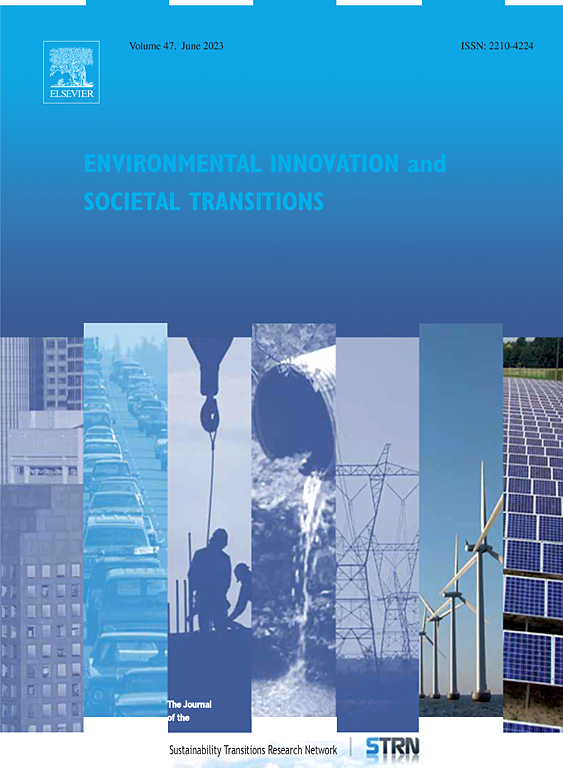政策的规模导向与技术合法性:挪威的去碳化案例
IF 5.7
2区 经济学
Q1 ENVIRONMENTAL SCIENCES
Environmental Innovation and Societal Transitions
Pub Date : 2024-10-09
DOI:10.1016/j.eist.2024.100919
引用次数: 0
摘要
本文认为,我们需要更好地理解政策依据及其标度取向之间的关系。前者指的是提出政策的根本动机。后者指的是两个方面:政策所要应对的挑战的地理位置,以及政策所要促成的效果的地理位置。国家层面的气候和能源政策在尺度取向上的这种差异,可能会导致(不)支持有助于去碳化的技术的理由不同,这也取决于这些技术是否与更广泛的背景结构相一致。因此,政策依据的尺度取向可能会对技术合法性产生重大影响。我们建立了一个概念框架,区分了地方/全球挑战和影响中的四种规模导向。通过实证研究,我们分析了挪威政策依据的尺度取向变化如何影响了航运业的液化天然气、能源业的海上风电以及各用户部门的二氧化碳捕获和储存技术的合法性。本文章由计算机程序翻译,如有差异,请以英文原文为准。
Scalar orientation of policies and technology legitimacy: The case of decarbonization in Norway
This paper suggest that we need to better understand the relationship between policy rationales and their scalar orientation. The former refers to the underlying motivations for proposing policies. The latter refers to two dimensions: the geography of challenges that policy seek to address, and the geography of effects that policy seek to instigate. Such variations in the scalar orientation of national level climate and energy policy, may lead to differing rationales for (not) supporting technologies that can contribute to decarbonization, depending also on their alignment with broader context structures. In this way, scalar orientation of policy rationales may have significant implications for technology legitimacy. We develop a conceptual framework that distinguishes four types of scalar orientation in local/global challenges and effects. Empirically, we analyse how shifting scalar orientation of policy rationales in Norway has influenced legitimacy for LNG in shipping, offshore wind in the energy sector, and CCS for various user sectors.
求助全文
通过发布文献求助,成功后即可免费获取论文全文。
去求助
来源期刊

Environmental Innovation and Societal Transitions
Energy-Renewable Energy, Sustainability and the Environment
CiteScore
13.60
自引率
19.40%
发文量
90
审稿时长
56 days
期刊介绍:
Environmental Innovation and Societal Transitions serves as a platform for reporting studies on innovations and socio-economic transitions aimed at fostering an environmentally sustainable economy, thereby addressing structural resource scarcity and environmental challenges, particularly those associated with fossil energy use and climate change. The journal focuses on various forms of innovation, including technological, organizational, economic, institutional, and political, as well as economy-wide and sectoral changes in areas such as energy, transport, agriculture, and water management. It endeavors to tackle complex questions concerning social, economic, behavioral-psychological, and political barriers and opportunities, along with their intricate interactions. With a multidisciplinary approach and methodological openness, the journal welcomes contributions from a wide array of disciplines within the social, environmental, and innovation sciences.
 求助内容:
求助内容: 应助结果提醒方式:
应助结果提醒方式:


